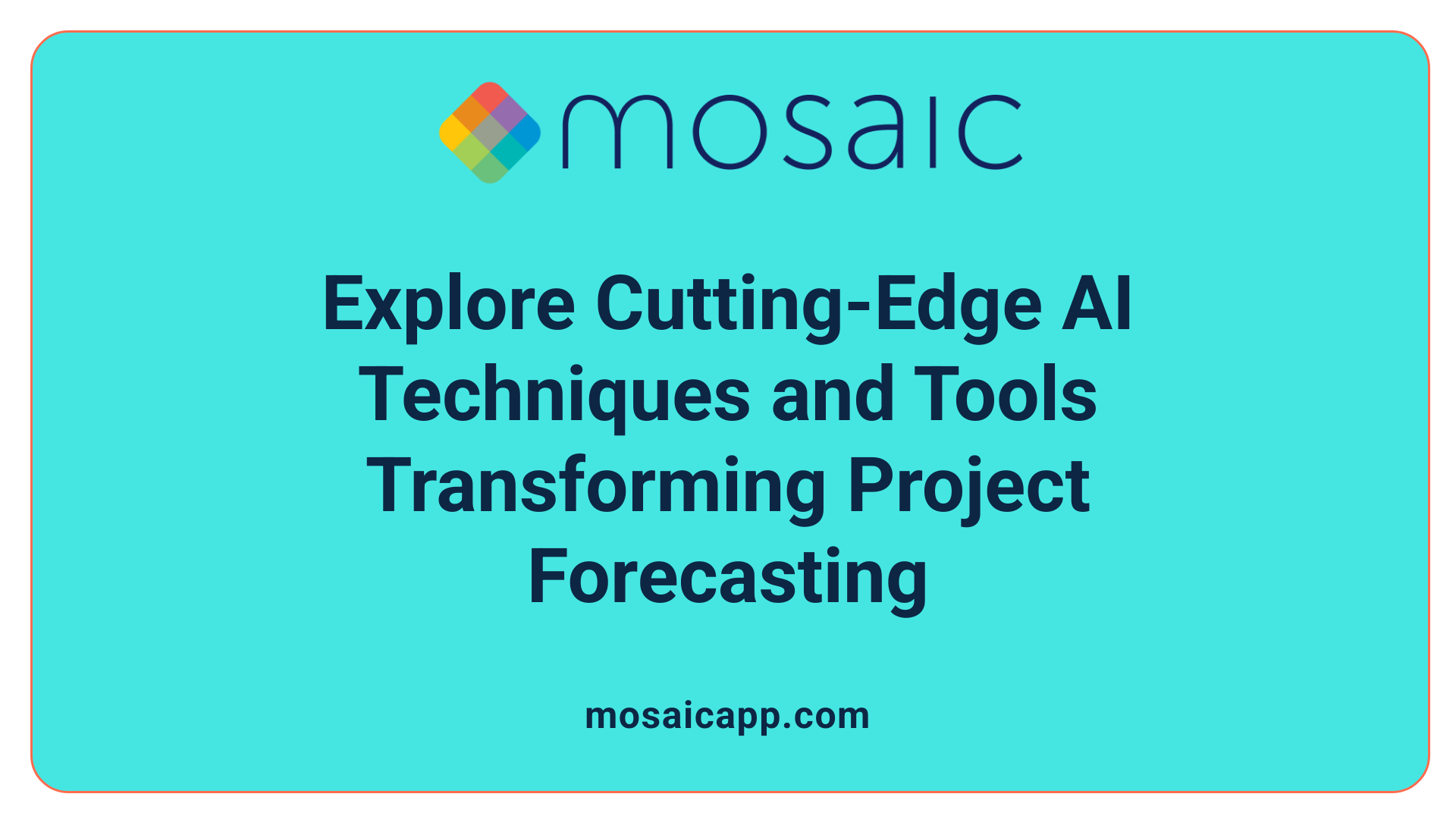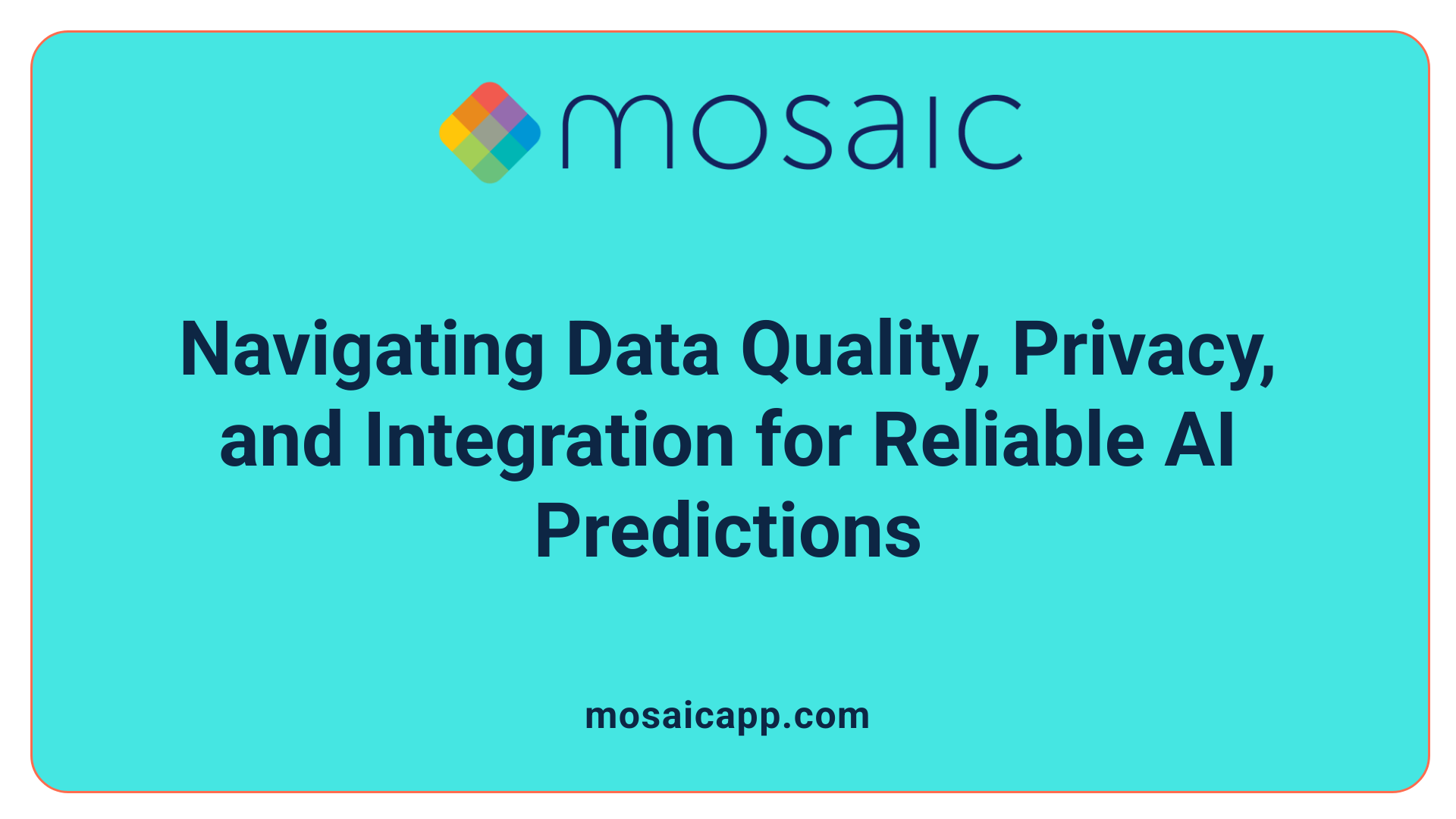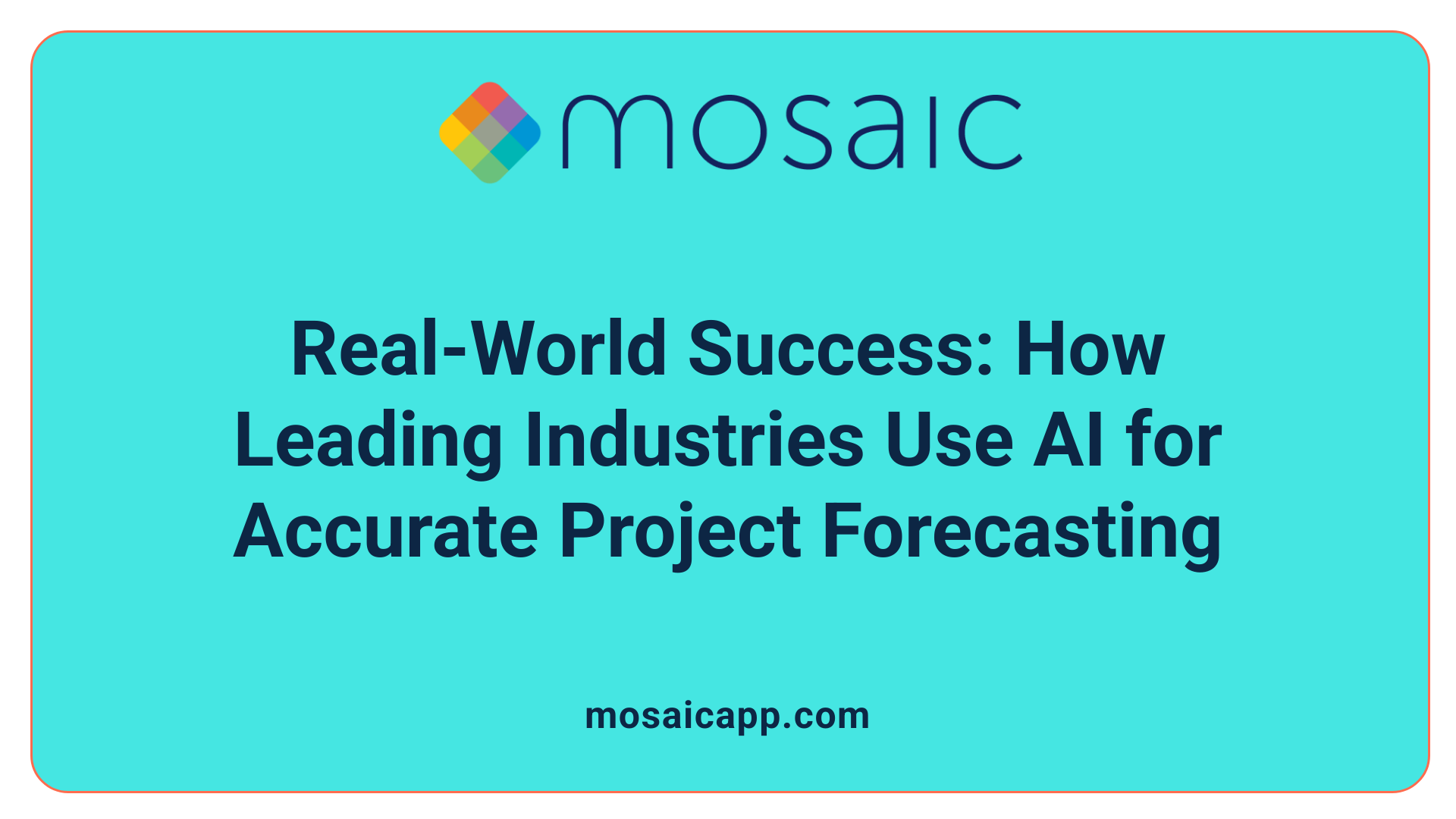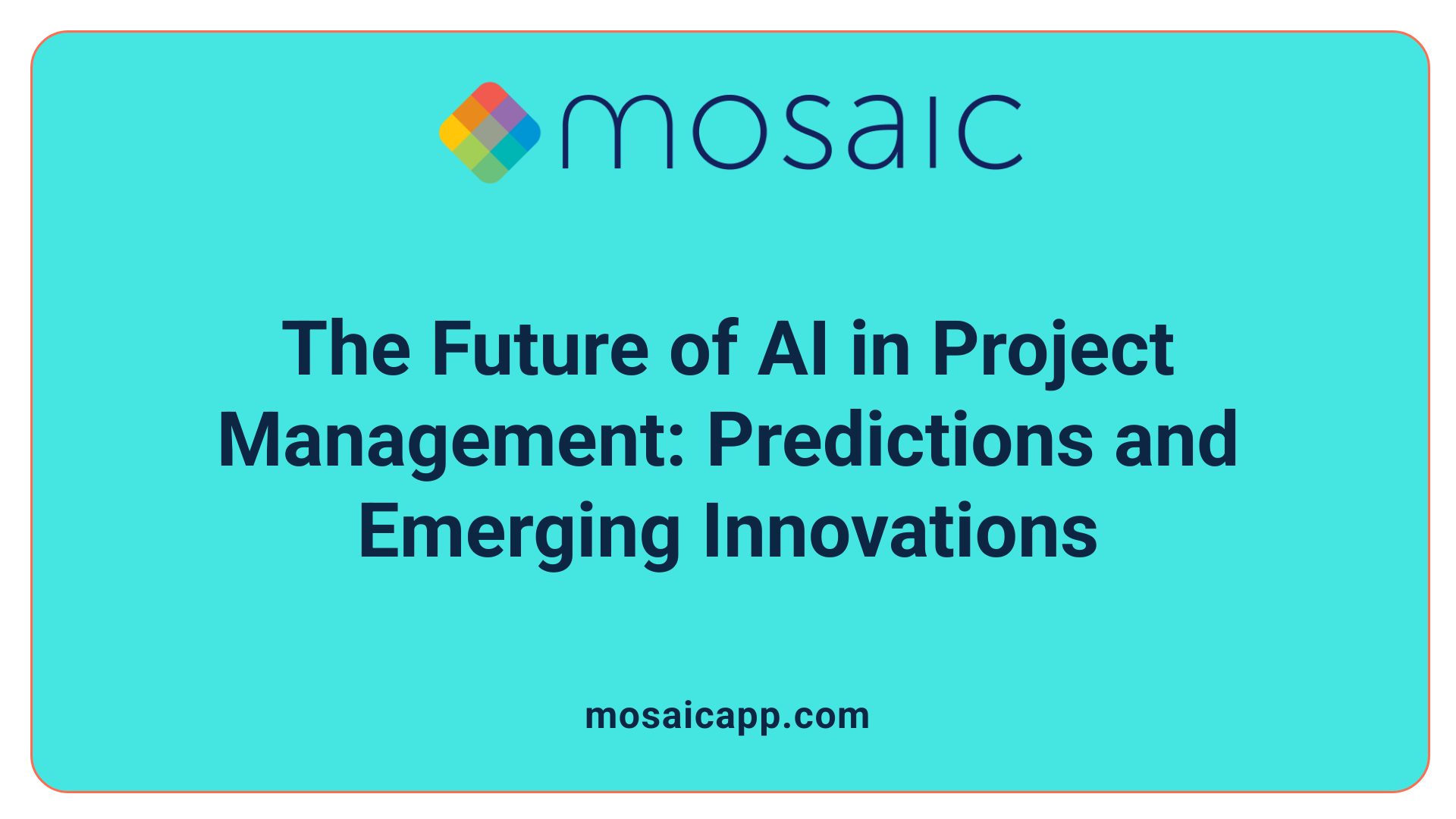Unlocking the Power of Artificial Intelligence in Project Success Predictions
Artificial Intelligence (AI) is transforming project management by enabling more accurate predictions of project outcomes, risks, and timelines. Leveraging historical data, real-time metrics, and sophisticated algorithms, organizations can make smarter decisions, optimize resources, and proactively address challenges, thereby increasing the likelihood of project success. This article explores the methodologies, benefits, and industry case studies demonstrating AI's profound impact on project forecasting.
Understanding How AI Predicts Project Outcomes

How can AI be used to predict project success or failure?
AI plays a crucial role in forecasting project outcomes by utilizing both historical and real-time data. It analyzes patterns in past project records, risk logs, performance metrics, and live project variables such as budgets, resource availability, and progress reports.
By examining this wealth of information, AI tools can identify early warning signs of potential delays, cost overruns, or project failures. These insights support project managers in making proactive decisions to mitigate risks and adjust plans before issues escalate.
Advanced AI systems incorporate predictive analytics that continuously update forecasts based on new data. For example, tools like Forecast.app and Jira with AI integrations analyze previous projects to set realistic timelines and budgets, dynamically recalculating estimates as projects progress.
Case studies, like those from Deltares and PwC, showcase improvements in project control and timeline accuracy, with some AI-powered projects reducing completion times by up to 20%. AI not only forecasts success or failure but also suggests optimal resource allocation and contingency plans.
However, the effectiveness of AI predictions depends on data quality, proper problem framing, and organizational readiness. Challenges such as inadequate data, technical infrastructure limitations, and leadership understanding can hinder implementation. Many AI initiatives face failure due to these issues, emphasizing the importance of strategic planning, staff training, and continuous improvement.
In summary, AI's ability to analyze extensive project data sets and recognize complex patterns makes it a powerful tool for predicting project success or failure, provided organizations ensure robust data practices and proper integration strategies.
Methodologies and Tools Powering AI-Driven Forecasting

What methodologies and tools are commonly used for AI-driven project forecasting?
AI-driven project forecasting relies on advanced analytical techniques to provide accurate and timely predictions about project timelines, costs, and resource needs. Central to this approach are machine learning models, data mining methods, and predictive analytics. These methodologies analyze vast amounts of historical project data, real-time metrics, and external factors to identify patterns, detect anomalies, and forecast future outcomes effectively.
Machine learning models, such as regression algorithms, decision trees, and neural networks, are trained on past project data to recognize trends and predict variables like completion dates and budget consumption. Data mining techniques enable the extraction of valuable insights from large datasets, uncovering hidden correlations that impact project performance.
Popular project management platforms now integrate these AI features to enhance decision-making. Tools like Anaplan, Workday Adaptive Planning, and Vena Solutions embed AI capabilities, such as scenario analysis, trend forecasting, and automated reporting, into their modules. These platforms facilitate demand forecasting, financial planning, and resource allocation, making projects more adaptive and resilient.
In addition, specialized AI forecasting solutions such as IBM Watson Studio, Google Cloud AI Platform, and Amazon Forecast offer sophisticated analytics and customizable models. They support continuous learning, allowing forecasts to be refined with new data, thus increasing their accuracy over time.
The convergence of these methodologies and tools enables organizations to make proactive, data-driven decisions. By leveraging machine learning, data mining, and integrated AI-powered project management platforms, teams can better predict potential risks, optimize resources, and improve overall project success rates.
Data Requirements and Challenges in AI Forecasting

What data is required for AI-based project predictive analytics, and what challenges are involved?
Implementing AI in project management relies heavily on diverse and detailed datasets. These include historical project records, resource availability logs, risk logs, financial and budget data, and real-time data such as email traffic, progress reports, and performance metrics. Collecting comprehensive data enables AI systems to identify patterns, forecast outcomes, and support proactive decision-making.
However, several challenges can hinder effective data utilization. Ensuring data quality is fundamental; this involves cleaning datasets, detecting anomalies, and standardizing formats to prevent errors in predictions. Integrating data from multiple sources—such as legacy systems, cloud platforms, and various departments—also presents significant obstacles, often requiring advanced data management tools and protocols.
Data privacy and security are critical concerns, especially when handling sensitive information like project costs and personnel details. Regulatory compliance adds another layer of complexity, demanding strict adherence to data protection standards. Sometimes, the volume of available data may be insufficient or biased, affecting model accuracy.
To address data scarcity, organizations are increasingly generating synthetic data that mimics real-world scenarios, enhancing model training without compromising privacy. Proper labeling and metadata documentation are vital to make data AI-ready, ensuring models learn relevant patterns effectively.
In summary, achieving reliable AI forecasting depends on gathering high-quality, integrated data while managing privacy, security, and compliance challenges. Overcoming these hurdles enables the development of trustworthy, unbiased models that significantly improve project outcomes.
The Impact of AI on Project Planning and Resource Management
How does AI contribute to risk management, scheduling, and budgeting in projects?
AI plays a vital role in improving these vital areas of project management. By utilizing predictive analytics and machine learning, AI can identify potential risks early, such as delays, safety issues, or budget overruns. It supports proactive planning through scenario simulations and "what-if" analyses that assess the possible impacts of risks, helping managers prioritize mitigation steps.
Routine tasks, including scheduling, expense tracking, and progress monitoring, are automated by AI, reducing human error and increasing efficiency. AI tools generate real-time insights into budget performance, flagging overspending or at-risk areas. They also forecast delays and potential cost overruns with high precision. Additionally, AI enhances strategic decision-making and streamlines communication via intelligent dashboards and chatbots, ensuring management remains well-informed and agile.
Organizations leveraging AI report higher success rates in project completion on time (61%) and more projects achieving or exceeding their expected benefits (69%). These improvements reflect AI’s capacity to provide holistic, early warnings and recommendations, making risk management, scheduling, and budgeting more effective.
How does AI enhance project scheduling and resource utilization?
AI substantially boosts project planning and scheduling accuracy by analyzing resource availability and project constraints. Examples demonstrate that AI-driven scheduling can cut project completion times by an average of 15%. This improvement results from better matching of resources to tasks, taking into account skills, availability, and workload conditions.
AI models predict future resource demands, suggesting optimal reallocations to avoid bottlenecks and idle times. By continuously analyzing current workloads and task dependencies, AI enables dynamic scheduling adjustments in real-time as project conditions evolve. This adaptability ensures that projects stay on track, delays are minimized, and productivity is maximized.
Further, AI tools assist in anticipating shortages or surpluses of manpower or equipment, allowing for better preparedness and resource balancing. This intelligent management leads to more efficient use of assets and personnel, ultimately reducing project durations and costs.
Benefits of AI in Project Success Prediction
What are the benefits of applying AI in project success prediction?
Integrating AI into project management offers a wide array of advantages that enhance the likelihood of project success. One of the primary benefits is the increased accuracy and dependability in forecasting project outcomes. Using advanced predictive analytics, AI models analyze historical data and current project metrics to predict potential delays, budget overruns, and even resource shortages.
Another significant benefit is the automation of routine and complex tasks. AI-driven tools can handle scheduling, monitor resource allocation, and assess risks without manual intervention. This automation frees project managers to focus more on strategic planning and decision-making, rather than day-to-day operational concerns.
AI also provides real-time project insights through dynamic dashboards, chatbots, and computer vision. These tools enable project teams to respond swiftly to emerging issues, making proactive adjustments that keep the project on track. Such timely interventions are crucial to maintaining momentum and managing risks effectively.
Improvements extend to planning and scheduling as well. AI analyzes resource availability and constraints to create more precise timelines, often reducing project completion time by an average of 15%. Additionally, AI enhances resource utilization by matching skills to tasks and forecasting future needs, leading to more efficient workflows.
Communication between team members and stakeholders is also strengthened through AI-powered apps that offer instant updates and facilitate collaboration. Enhanced communication reduces misunderstandings, aligns expectations, and promotes transparency.
As AI technologies continue evolving, their impact on project management is expected to grow substantially. By enabling more accurate forecasts, automating repetitive activities, and providing real-time insights, AI helps organizations achieve higher success rates, better resource management, and stronger strategic alignment.
Ultimately, these improvements contribute to increased project reliability, reduced costs, higher customer satisfaction, and a competitive edge in delivering complex projects. The ongoing integration of AI tools is transforming project management roles, paving the way for more predictive, responsive, and efficient project execution.
Industry Case Studies Demonstrating AI’s Effectiveness

Are there notable industry case studies demonstrating AI’s effectiveness in project forecasting?
Yes, several notable industry case studies showcase how AI improves project forecasting and overall project management.
In the construction sector, China State Construction deployed AI-based sensors and cameras to monitor projects in real time. This technology detected design deviations early, which helped reduce rework by 18%. Similarly, Fluor Corporation used AI to predict labor demands more accurately, enhancing scheduling efficiency and increasing productivity by 12%. These innovations led to more precise planning and significant cost and time savings.
The manufacturing and pharmaceutical industries also benefit greatly from AI-driven forecasting. A global agribusiness utilized AI to analyze large datasets, improving demand forecasting and production scheduling. This approach increased forecast accuracy by 8% and cut schedule generation time by 96%, enabling faster decision-making and resource allocation.
Construction giant Bechtel incorporated AI into resource management processes, resulting in 10% cost savings through better resource allocation and utilization. Meanwhile, Acciona leveraged AI to identify potential cost overruns early on. Detecting issues before they escalated contributed to a 15% reduction in overruns.
Beyond traditional sectors, large technology and healthcare firms are employing AI for market predictions, clinical planning, and operational improvements. These applications demonstrate the widespread impact of AI on project forecasting, with industries achieving higher accuracy, efficiency, and cost reductions.
Industry Sector AI Application Outcome Additional Details Construction Sensors & cameras for deviation detection Reduced rework by 18% Real-time design deviation monitoring Construction Labor demand prediction Increased productivity by 12% Enhanced scheduling accuracy Agriculture & Pharma Demand & production forecasting Increased forecast accuracy by 8%, 96% faster schedule Data analysis of large datasets Engineering & Infrastructure Resource management & cost control 10% cost savings, early overrun detection AI-enhanced resource allocation Tech & Healthcare Market, clinical, operational AI Improved planning and efficiency Broader industry impact
These case studies exemplify AI’s growing influence across various industries, demonstrating its ability to improve project outcomes through precise forecasting, resource optimization, and early risk detection.
Future Trends and Predictions in AI Project Forecasting

What predictions are made about AI’s future in project management?
Experts forecast that artificial intelligence will drastically reshape project management roles and processes within the next few years. By 2026, approximately 70% of job titles in the industry are expected to shift from traditional hierarchical roles to more role-based descriptors, reflecting AI's influence on operational functions.
Looking further ahead, by 2028, AI is anticipated to empower project management offices (PMOs) to predict project delays and budget overruns with over 90% accuracy. This capability will enable proactive adjustments, minimizing risks and keeping projects on track.
By 2030, a significant transformation is projected where AI could automate up to 80% of routine project management tasks. This change emphasizes the growing importance of human skills such as strategic thinking, creativity, and leadership, which AI is unlikely to replace.
These developments suggest a future where AI automates repetitive work, enhances decision-making, optimizes resources, and improves risk management. Consequently, the role of project managers will evolve from operational task handlers to strategic advisors working alongside intelligent systems.
Advancing technologies like predictive analytics, real-time data processing, and generative AI assistants will lead this transformation. The industry can expect increased efficiency, cost savings, and more accurate project outcomes, ultimately redefining the landscape of project management.
How will technological progress influence project management?
Ongoing innovations will enable more dynamic forecasting, scenario simulation, and automated reporting. As AI systems become more sophisticated, they will facilitate better communication, collaboration, and decision-making, making project management more agile and adaptive.
How are roles within project management expected to change?
The traditional roles will increasingly focus on strategic oversight, stakeholder communication, and managing AI tools. Human judgment, nuanced understanding, and ethical considerations will become even more valued, as they complement AI’s data-driven capabilities.
Future Milestones Expected Change Impact on Project Management Description 2026 Role-based job titles More specialized roles Tasks will be designed around specific AI-driven functions 2028 High accuracy AI predictions Proactive risk mitigation PMOs can preempt delays and issues effectively 2030 Automation of 80% of routine work Strategic focus Human expertise shifts to high-level decision-making
By embracing these trends, organizations aim to achieve higher efficiency, better project outcomes, and a competitive edge in the evolving landscape of project management.
Conclusion and Key Takeaways
AI has become an indispensable tool in modern project management, significantly enhancing the ability to predict, plan, and execute successful projects. Its capacity to analyze vast amounts of historical and real-time data enables organizations to identify risks early, forecast project outcomes more accurately, and optimize resource allocation effectively.
By integrating AI-driven predictive analytics, project teams can proactively address potential delays, budget overruns, and operational bottlenecks. For instance, tools such as Forecast.app and Jira with AI extensions help forecast timelines and costs based on historical project data, offering real-time insights that support better decision-making.
The implications of AI adoption extend beyond improved accuracy; they include higher on-time delivery rates (61% for AI projects versus 47% for non-AI ones), and a greater percentage of projects realizing their expected benefits. Additionally, organizations that leverage AI report higher rates of ROI achievement—64% compared to 52% without AI.
For organizations aiming to adopt AI in project management, strategic planning is crucial. This involves gathering and cleaning relevant data, training teams to interpret AI outputs, and embedding automation into workflows to streamline routine tasks. Such practices not only boost efficiency but also enable teams to focus on complex, value-adding activities.
Looking ahead, AI’s role in project management is poised to grow, with predictions suggesting that by 2028, over 90% of project delays and budget issues could be predicted with high accuracy. By 2030, AI may handle the majority of project management work, emphasizing the importance of developing human-AI collaboration skills.
Ultimately, organizations that embrace AI’s potential stand to benefit from increased project success rates, cost savings, and enhanced strategic decision-making. Integrating AI into all phases of project management will be vital for maintaining competitiveness and driving innovation in the industry.
How can organizations leverage AI forecasting for better project outcomes? To effectively leverage AI forecasting for improved project success, organizations should integrate AI tools into all phases of project management, including planning, risk assessment, and resource allocation. Continuous collection and updating of relevant data are essential for maintaining accurate predictions, while training teams to interpret AI insights ensures these tools are used effectively. Utilizing AI-driven predictive analytics can proactively identify potential delays, overruns, and risks, enabling timely corrective actions. Automating routine tasks such as progress tracking, report generation, and resource management allows project managers to focus on strategic decision-making and stakeholder engagement. Additionally, fostering an organizational culture that embraces AI-driven insights and gradually implementing these technologies can provide a competitive advantage and significantly enhance project outcomes.
Harnessing the Future of Project Success with AI Forecasting
Artificial Intelligence is poised to revolutionize project management by providing unparalleled predictive capabilities that enable organizations to foresee challenges, optimize resources, and ensure successful project delivery. As AI technologies continue to evolve, integrating these tools into project workflows will become indispensable for achieving strategic objectives and maintaining competitive advantage. Organizations that adopt AI-driven forecasting early will be better equipped to navigate complexities, adapt to change, and realize their project goals with higher efficiency and confidence.
References
- The Role of AI in Predicting Project Success and Failure
- Top 10 Ways AI is Transforming Project Management in 2025
- The Future of Project Forecasting: AI-Powered Predictive ...
- Project Management with AI - Predicting Timelines
- How AI is Revolutionizing Project Management for Tech ...
- Using Artificial Intelligence for Project Management
- Using Artificial Intelligence for Project Management
